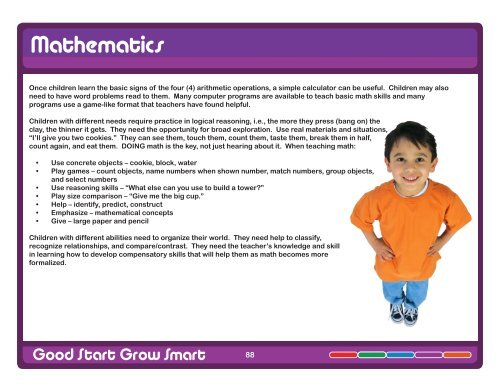Good Start, Grow Smart Early Learning Standards - SC Department ...
Good Start, Grow Smart Early Learning Standards - SC Department ...
Good Start, Grow Smart Early Learning Standards - SC Department ...
Create successful ePaper yourself
Turn your PDF publications into a flip-book with our unique Google optimized e-Paper software.
Once children learn the basic signs of the four (4) arithmetic operations, a simple calculator can be useful. Children may also<br />
need to have word problems read to them. Many computer programs are available to teach basic math skills and many<br />
programs use a game-like format that teachers have found helpful.<br />
Children with different needs require practice in logical reasoning, i.e., the more they press (bang on) the<br />
clay, the thinner it gets. They need the opportunity for broad exploration. Use real materials and situations,<br />
“I’ll give you two cookies.” They can see them, touch them, count them, taste them, break them in half,<br />
count again, and eat them. DOING math is the key, not just hearing about it. When teaching math:<br />
• Use concrete objects – cookie, block, water<br />
• Play games – count objects, name numbers when shown number, match numbers, group objects,<br />
and select numbers<br />
• Use reasoning skills – “What else can you use to build a tower?”<br />
• Play size comparison – “Give me the big cup.”<br />
• Help – identify, predict, construct<br />
• Emphasize – mathematical concepts<br />
• Give – large paper and pencil<br />
Children with different abilities need to organize their world. They need help to classify,<br />
recognize relationships, and compare/contrast. They need the teacher’s knowledge and skill<br />
in learning how to develop compensatory skills that will help them as math becomes more<br />
formalized.<br />
88


